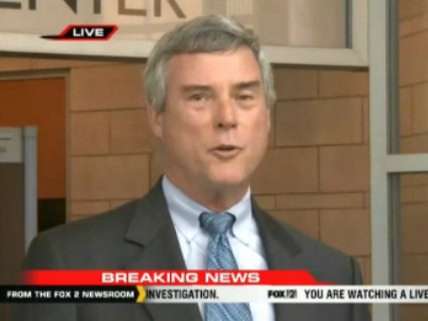If the Grand Jurors Had Indicted Darren Wilson, Would Prosecutors Have Been Obligated to Ignore Them?

The other day I argued that the grand jurors who rejected criminal charges against Darren Wilson in the death of Michael Brown misconstrued their task. They were not supposed to decide whether Wilson should be convicted; they were supposed to decide whether there was probable cause to believe he broke the law. Sheila Whirley, one of the assistant county prosecutors guiding the process, put it this way on November 21:
Your standard of proof is still probable cause. You're not here to determine guilt or not guilty. It is probable cause: Is it enough to go to trial?
Whirley's colleague Kathi Alizadeh elaborated on this point:
You must find probable cause to believe that [Wilson] committed the offense that you're considering, and you must find probable cause to believe that he did not act in lawful self-defense [and] that he did not use lawful force in making the arrest.
With several eyewitnesses testifying that Brown did not pose a threat and appeared to be surrendering when Wilson shot him to death in the street, it seems to me there is enough evidence for probable cause on all these points, although that does not necessarily mean there is enough evidence to prove Wilson's guilt beyond a reasonable doubt. The latter judgment is reserved for a trial jury.
If the extensive testimony the grand jurors heard had been presented in a trial, advocates on both sides would have had an opportunity to cross-examine the witnesses, which might have given us a clearer idea of what actually happened. I am still skeptical that the state would be able to meet its burden of proof, but that does not mean it should not have tried.
St. Louis County Prosecuting Attorney Robert McCulloch clearly did not want to prosecute Wilson, but neither did he want to take responsibility for that decision. So instead he left it to the grand jurors, guiding them toward the correct conclusion by reinforcing Wilson's self-defense claim. Powerline blogger Paul Mirengoff, who defends McCulloch's approach, describes it this way:
Normally, prosecutors try to guide a grand jury towards an indictment. Almost invariably, prosecutors succeed. Hence the cliche that a prosecutor can get a grand jury to indict a ham sandwich.
In this case, though, the prosecutor did not get an indictment. Nor, from all that appears, did he attempt to get one. If anything, he may have steered the grand jury away from indicting Wilson….
Prosecutors push through indictments when they believe a party has committed a crime and that they have a decent shot of proving so in court. If they believe a party is innocent of criminal wrongdoing and/or that they will lose at trial, prosecutors typically don't initiate criminal proceedings before a grand jury. Why would they?
In Wilson's case, the prosecutor obviously believed that Wilson should not be prosecuted. Normally, then, he would not have initiated criminal proceedings at all or, at most, he would have held a perfunctory hearing that resulted in no indictment.
Instead, the prosecutor held an elaborate grand jury proceeding.
The problem is that, as Georgetown law professor Randy Barnett noted on Twitter in response to my blog post, "Prosecutors have an ethical obligation not to prosecute those they think are innocent." If McCulloch believed Wilson was innocent, why would he let the grand jurors decide whether charges should be brought? And if they did approve charges, wouldn't he be ethically obligated to disregard their determination?
"Whatever [your] decision is, it will be the correct decision and we will stand by that 100 percent," Alizadeh told the grand jurors. "Our opinions don't matter. It is up to you and what you guys think." Yet this seems like a situation where only one outcome was acceptable, which renders the whole process suspect.


Show Comments (116)